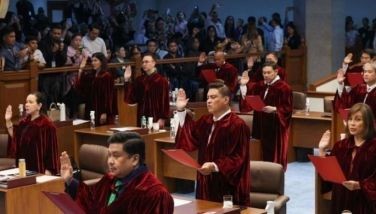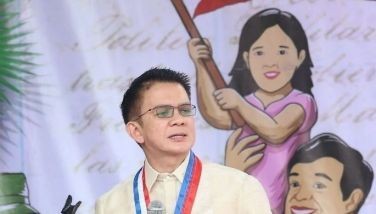People more important than gold

Have you ever wondered why despite our country’s vast natural resources we remain really quite poor compared to places like Singapore, Hong Kong or Taiwan? Those three Asian tigers only have their people to bank on. They are bereft of the natural resources we take for granted. Indeed, Singapore does not even have fresh water and Hong Kong and Taiwan are rocky domains.
New York Times columnist Thomas Friedman wrote about this conundrum this week. He discussed a study undertaken by the Organization for Economic Cooperation and Development, or OECD that saw a correlation between the scores of high school kids in 65 countries on math, science and reading with the natural resources the countries extract.
The results indicated that there was a significant negative relationship between the money countries extract from national resources and the knowledge and skills of their high school population. Friedman was not surprised and neither was I.
The NYTimes columnist wrote that he always tells his friends in Taiwan: “You’re the luckiest people in the world. How did you get so lucky? You have no oil, no iron ore, no forests, no diamonds, no gold, just a few small deposits of coal and natural gas — and because of that you developed the habits and culture of honing your people’s skills, which turns out to be the most valuable and only truly renewable resource in the world today. How did you get so lucky?”
Oh no… does that mean we are cursed? We have (or had) lush forests. We have also exploited our gold, copper, nickel, coal and some natural gas. We have flowing rivers that constantly irrigate and fertilize our rich agricultural lands and we have some of the best marine life and beaches in the world. Why are we so cursed?
Even the Bible, Friedman’s column noted, shows how the Jews were blessed: “Moses arduously led the Jews for 40 years through the desert — just to bring them to the only country in the Middle East that had no oil. But Moses may have gotten it right, after all. Today, Israel has one of the most innovative economies, and its population enjoys a standard of living most of the oil-rich countries in the region are not able to offer.”
I was thinking… what if we pretended we didn’t have all those natural resources to fall back on… and just did what the Taiwanese, Singaporeans and Hong Kongers did to achieve prosperity? What if we just focused on our people, helping them hone their skills and use their creativity?
The OECD study showed students in Singapore, Finland, South Korea, Hong Kong and Japan stand out as having high scores and few natural resources, while Qatar and Kazakhstan stand out as having the highest income from oil and the lowest scores. Also lagging were students in many of the resource-rich countries of Latin America, like Brazil, Mexico and Argentina.
On the other hand, Canada, Australia and Norway scored high even with their high levels of natural resources. The observation was made that this is because all three countries have established deliberate policies of saving and investing what they get from their natural resource, and not just consuming them. This could be a model of “responsible mining” we can follow.
The OECD study, Friedman points out, is revealing that societies that get addicted to their natural resources seem to develop parents and young people who lose some of the instincts, habits and incentives for doing homework and honing skills… why bother when Mother Nature so generously provides?
In contrast, “countries with little in the way of natural resources — Finland, Singapore or Japan — education has strong outcomes and a high status, at least in part because the public at large has understood that the country must live by its knowledge and skills and that these depend on the quality of education. ... Every parent and child in these countries knows that skills will decide the life chances of the child and nothing else is going to rescue them, so they build a whole culture and education system around it.”
So, Friedman says, “if you really want to know how a country is going to do in the 21st century, don’t count its oil reserves or gold mines, count its highly effective teachers, involved parents and committed students.”
Friedman quotes Andreas Schleicher, who undertook the OECD study: “Knowledge and skills have become the global currency of 21st-century economies, but there is no central bank that prints this currency. Everyone has to decide on their own how much they will print.”
“Sure, it’s great to have oil, gas and diamonds; they can buy jobs. But they’ll weaken your society in the long run unless they’re used to build schools and a culture of lifelong learning,” Friedman echoes.
That does it. I guess we are screwed… unless we, by some miracle, wake up and realize the continuing error of our ways and follow the prescription for success underscored by the OECD study. And it is shockingly simple: invest on our people. They are more important than gold.
Marcopper
An oldtimer wrote me an interesting e-mail about Marcopper and the bad old days.
I have some knowledge of Marcopper, I don’t exactly remember the date but it was probably in the early 70’s that I convinced my father to buy shares of Marcopper over the counter since it was not yet listed in the Stock Exchange. I had some inside information on the company (at that time insider trading was not illegal). The mining claims of Marcopper were owned by an American named Cadwalleger and he incorporated the company with an initial capital of only P12 million. At that time the Parity agreement had not yet expired and so Americans had the same rights as Filipinos.
When Placer Dome came in, I guess they got 40 percent of the company due to the 60/40 rule, but they secured a $40 or $60 million loan to develop the mine. The price of copper at that time was pretty high and mining copper must have been very profitable.
The exports of Marcopper averaged $4 million every month and 75 percent of the proceeds directly paid to the foreign banks who provided the money to develop the mine. There were rumors that Marcos was a secret stockholder of the company since the Central Bank at that time would not have allowed such huge percentage of the monthly exports as payment for the loan.
The loan was paid off in a short period of time. When Marcopper was listed in the stock exchange it immediately declared a stock dividend of 800 percent. We made only a little money since my father sold our Marcopper shares without informing me a month or so after he bought the shares and so we did not get the 800 percent stock dividend.
Anyway as for the pollution aspect, Marcos criminally allowed Marcopper to build a pipe directly to the sea to dump most of their tailings, according to former Marinduque Governor Emmanuel Lecaroz. He said Marcos called him and told him to approve the pipeline. He said he was against the pipeline and so he consulted with the people of Marinduque. He told them that if he does not approve the pipeline, Marcos will remove him as governor since this was during Martial Law.
Our mining laws are now very strict and I don’t think the mining practices of Marcopper will be allowed today. We should also differentiate between the small miners and big mining firms.
An Australian executive of Vale Mining, one of the biggest mining companies in the world, told me that the Philippines has the second biggest mineral reserves in the world. Investors are turned away from this country because of our ever changing laws which is like changing horses in midstream.
One last civic duty
Lawyer Sonny Pulgar sent this one.
An old man was critically ill. Feeling that death was near, he called his lawyer. “I want to become a lawyer. How much is it for the express degree you told me about?”
“It’s $50,000,” the lawyer said. “But why? You’ll be dead soon, why do you want to become a lawyer?”
“That’s my business! Get me the course!”
Four days later, the old man got his law degree. His lawyer was at his bedside, making sure his bill would be paid.
Suddenly the old man was racked with fits of coughing and it was clear that this would be the end. Still curious, the lawyer leaned over and said, “please, before it’s too late, tell me why you wanted to get a law degree so badly before you died?”
In a faint whisper, as he breathed his last, the old man said, “One less lawyer . . .”
Boo Chanco’s e-mail address is bchanco@gmail.com. Follow him on Twitter @boochanco
- Latest
- Trending





























